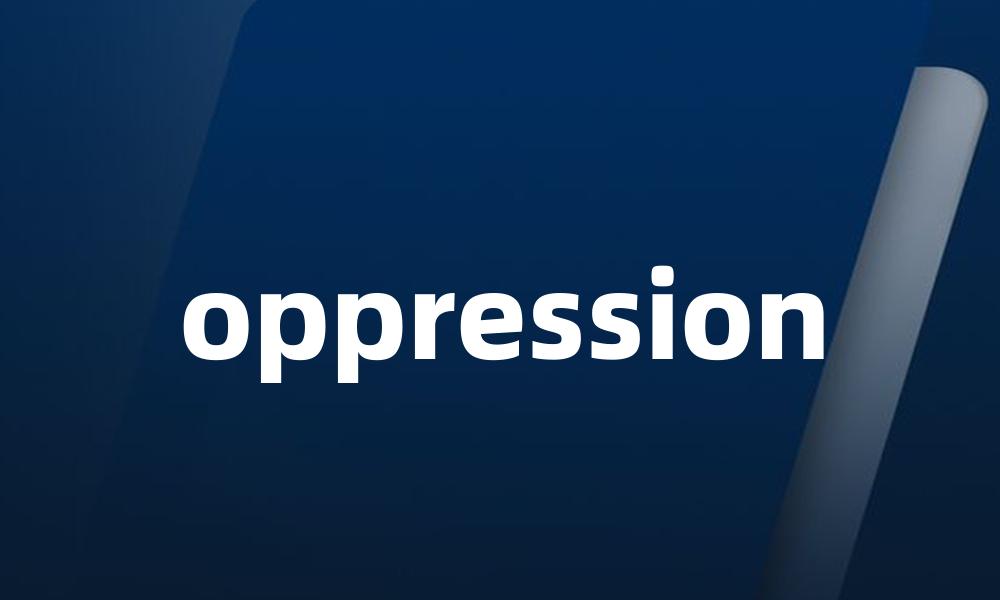
中英词典:oppression
形容词
oppressive [əˈprɛsɪv]
- 令人压抑的
- 压迫性的
名词
oppression [əˈprɛʃən]
- 压抑
- 压迫
- 压制
词语辨析
oppression和suppression都含有压抑、压迫的意思,但oppression更侧重指压迫的长期性和系统性,而suppression则更侧重指压制、镇压某种行动或思想。
词汇扩充
oppressive regime(压迫性政权)
oppressive laws(压抑性法律)
oppressive atmosphere(压抑的氛围)
oppressive government(压迫性政府)
近义词
tyranny, despotism, subjugation, repression
反义词
freedom, liberation
柯林斯词典
oppression
1. The oppression of a group of people involves putting great pressure on them and making it difficult for them to live as they want to.
2. Oppression is cruel or unfair treatment of a group of people by a more powerful group.
牛津词典
oppression
1. Prolonged cruel or unjust treatment or control.
2. The state of being subject to unjust treatment or control.
用法
oppression
- They fought against oppression and for freedom.
- The regime was known for its oppressive measures against dissidents.
- She felt a sense of oppression in the crowded room.
- The protesters demanded an end to the oppression of minority groups.
例句
- They fought against oppression and for freedom. (他们为反抗压迫而奋斗,争取自由。)
- The regime was known for its oppressive measures against dissidents. (这个政权以对异议人士的压迫措施而闻名。)
- She felt a sense of oppression in the crowded room. (她在拥挤的房间里感到一种压抑感。)
- The protesters demanded an end to the oppression of minority groups. (抗议者要求结束对少数群体的压迫。)
- Living under the oppressive rule of the dictator, the people longed for freedom. (人们在独裁者的压迫统治下生活,渴望自由。)
- The oppression of women in that society has led to a feminist movement. (在那个社会中,对女性的压迫导致了女权主义运动。)
- He grew up in an oppressive household where his opinions were constantly disregarded. (他在一个压抑的家庭中长大,他的意见经常被无视。)
- The oppressed population finally rose up against their oppressors. (受压迫的人民终于起来反抗压迫者。)
- She couldn't bear the oppressive heat and sought refuge in the shade. (她无法忍受那种令人窒息的炎热,于是躲进了阴凉处。)
- The novel portrays the oppression faced by the lower class in vivid detail. (这本小说生动地描绘了下层阶级面临的压迫。)
- Under the oppressive regime, free speech was heavily restricted. (在压迫性政权下,言论自由受到严重限制。)
- The workers organized strikes to protest against the oppressive working conditions. (工人组织罢工,抗议压迫性的工作条件。)
- The oppressive government stifled any form of dissent. (压迫性的政府扼杀了任何形式的异议。)
- The oppressive laws prevented the minority from fully participating in society. (压抑性法律阻止了少数群体充分参与社会。)
- She felt a sense of oppression and anxiety in the crowded city streets. (在拥挤的城市街道上,她感到一种压抑和焦虑。)
- The oppressive regime used fear tactics to maintain control over the population. (压迫性政权使用恐惧战术来控制人民。)
- The novel highlights the oppression of women in a patriarchal society. (这本小说突出了男权社会中对女性的压迫。)
- They protested against the social oppression faced by marginalized communities. (他们抗议边缘社群面临的社会压迫。)
- She finally escaped from the oppressive environment and found solace in a new city. (她终于逃离了那个压迫的环境,在新的城市找到了慰藉。)
- Oppression often leads to resistance and rebellion. (压迫往往会导致抵抗和反抗。)

 小皮
小皮